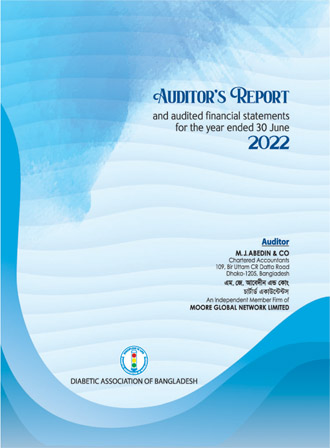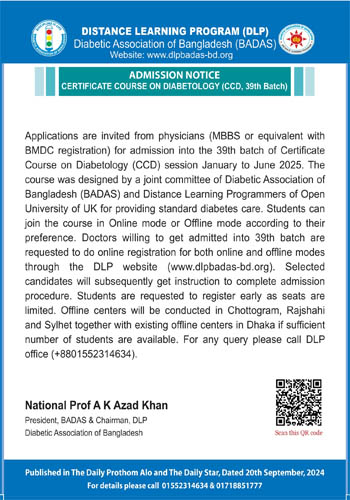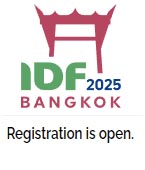Centre for Health research and Implementation (BADAS-CHRI)
Project Overview
Centre for Health Research and Implementation (BADAS-CHRI), formerly BADAS-Perinatal Care Project (BADAS-PCP) was established in 2002 at the initiative of Prof. Anthony Costello and Prof. A K Azad Khan, and is a collaborative project of Diabetic Association of Bangladesh (BADAS), Women & Children First (UK) and University College London Institute for Global Health, UK.
Initially, its aim was to improve maternal and newborn health in rural areas in Bangladesh through community mobilisation with women’s groups using the participatory learning action cycle. The project was implemented in 18 Unions under 6 Upazilas of 3 Districts (Bogra, Faridpur and Moulvibazar) from 2004, covering around 534,000 populations. Women and under-5 children’s health was incorporated in the intervention during scaling up of the project in 2008. After June 2013, CHRI worked in 6 unions of 4 upazilas under two districts (Faridpur and Bogra).
More recently, CHRI implemented a randomized controlled trial (D-Magic Trial) to examine the role of participatory groups using PLA cycle and mobile messaging to prevent and control type2 diabetes in 4 upazilas of Faridpur district. The trial showed that there was a large reduction in the combined prevalence of type 2 diabetes and intermediate hyperglycaemia in the participatory group compared with the control group with an absolute reduction of 21%. The trial also showed a 9% absolute reduction in the two year cumulative incidence of diabetes among the group with intermediate hyperglycemia cohort in the participatory group versus control arm.
Following this trial CHRI has received a grant titled “The Bangladesh D:Clare Project: Diabetes: Community-led Awareness, Response and Evaluation” from Medical Research Council (MRC), UK in 2019 to gain deeper understanding of the mechanisms of intervention effect, describe the sustainability of our intervention, understand how the intervention should be adapted for the urban context, and develop a scale-up strategy. The project is being implemented in 5 upazilas of Faridpur including previous 4 upazilas.
Besides D:Clare Project, CHRI has also received two separate grants in 2019, titled “Developing and evaluating an adapted behavioural activation intervention for people with depression and diabetes in South Asia (DiaDeM)” and “Developing an integrated community mobilisation package to prevent childhood injuries in rural Bangladesh” respectively. DiaDeM is a four-year project funded by National Institute for Health Research (NIHR), UK and injury prevention project is 18 months’ duration and funded by MRC, UK.
The Network for Improving Quality of Care for Maternal, Newborn and Child Health (QCN) Evaluation project starts in December 2018 and it will run until March 2022.This research is funded as part of the UK MRC Health Systems Research Initiative 5th call.
Major Activities
A. BADAS-CHRI organized a community orientation meeting for D:Clare Project at Conference Room, Faridpur Diabetic Association on January 16, 2020. Dr Abdul Kuddus, DPD, made a presentation on the significance of this new trial and spoke in brief about the recently concluded DMagic Trial. The meeting saw a very good turnout of about 75 attendees comprising of:The Chief Guest- Ms Ruksana Rahman, Additional Deputy Commissioner of Faridpur; Special Guests- Deputy Civil Surgeon and Deputy Director, Family Planning, Faridpur; Guests of Honour - 2 Upazilla Parishad Chairmans ( Boalmari, Alfadanga); Prof AK Azad Khan, President, Diabetic Association of Bangladesh; Chairperson- Prof Sheikh Abdus Samad, General Secretary, faridpur Diabetic Association; Other Attendees: Upazilla vice-chairmen, Union Chairmen, local government officials, NGO representatives, local leaders, journalists and many others from the Faridpur Diabetic Association and its medical college and Staff from the BADAS CHRI Dhaka and Faridpur local office.
-
We organized a 6 days training on Community Mobilization and prevention and control of type 2 diabetes for the Facilitators, Supervisor District Manager that was held from 12-17 February 2020 at Faridpur office.
Senior Manager, Participatory Groups conducted the training for “The Bangladesh D:Clare Project: Diabetes: Community-led Awareness, Response and Evaluation”. The project is funded by Medical Research Council, UK and is being implemented in 4 upazilas of Faridpur district. - 52 participatory group meetings were conducted on prevention and control of type 2 diabetes in 49 villages of Alfadanga upazila by Field Facilitators from March 10-18, 2020 under D-Clare Project. Among them 29 were female group meetings and 23 were male group meetings.
Total 1198 participants attended in 52 meetings. Average attendance per group was 23. The number of men’s group meetings was less than women’s group meetings due to their involvement in hats (local markets) and in leisure acivities. The group’s activities were running well, but the activities have been stopped from 19th March’2020 due to covid-19 outbreak.
B. 3 Advisory Committees were formed in 3 unions of Alfadanga Upazila of Faridpur for D-clare project. This committee involves local leaders, teachers, imams, govt. health workers and NGO staff.
C. A Household survey was conducted among 3049 pre-selected households of Alfadanga upazila of Farodpur district from December 2019 to January 2020 under D-Clare project. Following household survey, a baseline survey was conducted among a random sample of 1300 adults aged >30 years in 41 villages from February to March 2020.
All fieldworkers were given 10 days training on survey methods and how to take physical measurements followed by one week supervised field practice and daily debriefs in villages in Faridpur that were not included in the study. Fieldworkers measured blood glucose and conducted an insulin tolerance test with a repeat blood test 120 min post glucose ingestion. Blood pressure, anthropometric, socioeconomic, lifestyle and behavioural risk factors data were also collected. Data collectors were supervised by three field supervisors with experience in survey methods.
D. BADAS-CHRI organized a meeting at DGHS on May 28, 2020 and Dr Abdul Kuddus, Deputy Project Director (DPD), BADAS-CHRI presented the QCN Project “How does a multi-country, multilateral network focused on specific health care improvements evolve and what shapes its ability to achieve its goals?” It is a three-year research project, funded by Medical Research Council, UK to examine and improve the QCN theory of change and explore how country level impacts are created and to learn how to improve the strategy for future countries and related initiatives. Dr Md. Aminul Hasan, Line Director, Hospital and Clinics and Focal Person, Quality Improvement Secretariat, Health Economics Unit, Misnistry of Health and Family Welfare and Prof AK Azad Khan, President, Diabetic Association of Bangladesh were present in the meeting.
- As part of QCN Project we conducted 20 in-depth interviews with network members and relevant key stakeholders at national and local level. National level stakeholders are included - Government employees e.g. Director, Hospital and Clinics, Line Director, Program Manager, MNC&AH, Deputy Program Manager CBHC, Consultants of QIS, representatives from UNICEF, UNFPA, WHO, IHI, Save the Children, OGSB and local level stakeholder are included- Civil Surgeon, Residential Medical Officer, UH &FPO and UNICEF staff. We also conducted a quantitative survey among relevant stakeholders at national and local levels. Transcription and Translation of stakeholder interviews were completed.
- We observed two district hospitals-Manikganj and Kurigram and two sub-district hospitals under Manikganj and Kurigram district using an observation checklist. Based on this hospital observation we prepared a report and shared with concerned authorities.
- We reviewed relevant online documents and documents preserved at Quality Improvement Secretariat, Health Economics Unit as a part of QCN project. These included strategy and management documents, operational plans, directives and formal minutes. We also attended several meetings jointly organized by Quality Improvement Secretariat held at Quality Improvement Secretariat, UNICEF and UNFPA as observer participants.
E. District Manager of Faridpur attended GO-NGO coordination meeting regularly. The coordination meeting is held every month. All NGOs working in Faridpur attend the meeting and present their activities to apprise the government authorities.




